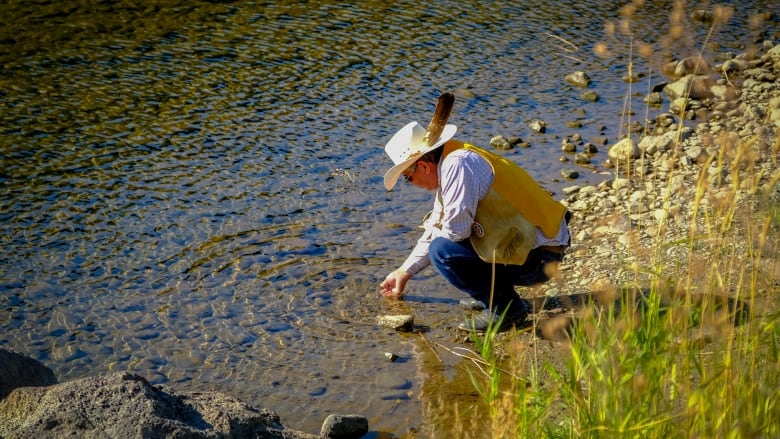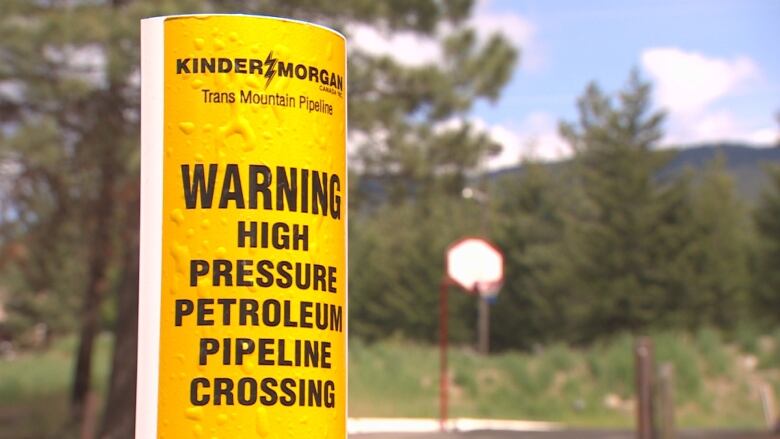Coldwater band asks Ottawa to intervene after Trans Mountain changes aquifer study plans
Aquifer study part of the conditions of approval for pipeline expansion

The Coldwater band is calling for federal intervention after Trans Mountain announced it was changing the way it would study the aquifer the First Nation relies on for its drinking water.
In a letter penned to the federal government, Chief Lee Spahan wrote that he sees "a crisis is emerging with Trans Mountain failing to live up to previous commitment it has made to properly study our aquifer."
Coldwater, a band within the Nlaka'pamux Nation whose reserve is located about 100 kilometres southwest of Kamloops, B.C., hasconcerns about the route of the twinned pipeline and how it might impact thesource of drinking water in the community.
The National Energy Board (now Canada Energy Regulator) tasked Trans Mountain with completing a hydrogeological study of the aquifer that flows beneath and around Coldwater, under its conditions of approval for its pipeline expansion, before starting constructionin the area.
Coldwater's concerns have been at the forefront of two Federal Court of Appeal cases focused on the expansionas well as regulatory hearings where the band has argued for a route change to avoid the aquifer entirely.
The existing Trans Mountain pipeline runs through the Coldwater reserve and there is a spill site on the reserve that has yet to be remediated. Trans Mountain plans to construct its expansion line just outside the reserve boundaries.
Drillingdelays
Trans Mountain wrote to the regulator in mid-March to say it was changing the way it would complete the study, deviating from the program agreed to with Coldwater, because of delays in getting on the reserve where six exploratory drill sites were supposed to be put in place.
"Trans Mountain has no reasonable choice but to proceed to complete its report without the data from that program," the company wrote in a letter to the regulator on March 13.
Trans Mountain's letter says it toldColdwaterin December 2019that if the First Nationdid not permit the company to start drilling at the sitesby early February, the company wouldcomplete the report based on other data sources.

Spahan's letterto Natural Resources Canada and Indigenous Services says Coldwaterwas still in talks with Tran Mountainin early February aboutthe drilling program, with meetings planned in early March about plans to begin clearing drill pads on-reserve. Coldwaterthen got a letter from the company Feb. 20 saying it would go ahead with the report without the drilling.
Spahan's lettersayswhen Canada re-approved the project, "it did so knowing that Coldwater and Trans Mountain had planned a hydrogeological study that included exploratory drilling at six agreed to locations on Coldwater [reserve]."
Coldwater wants the federal government to step into ensure the study can get "back on track" according to the approach that was mutually agreed upon, before Trans Mountain submits its aquifer report to the Canada Energy Regulator.
Spahan's lettersays"Unless Canada intervenes, Trans Mountain will undermine the commitment that Canada relied on in approving the project."
Trans Mountain to file report by May 15
In an emailed statementon Tuesday,Trans Mountain saidthe "fieldwork we require for the aquifer study has been completed" and the company plans to submit its report to the regulator by May 15, or potentially sooner.
"We believe the work we have done will support the condition requirementsand we are continuing to advance the on-reserve aquifer work with Coldwater."
It added it was "actively seeking co-operation from Coldwater in assessing an alternative route" for the pipeline expansion.
In an emailed statement, Natural Resources Canada acknowledged receiving Spahan's letter and said the ministries are developing a response.
"We value our relationship with Coldwater, and both ministers are fully aware of their concerns about the groundwater and aquifer under Coldwater Indian Reserve," said the statement.












_(720p).jpg)


 OFFICIAL HD MUSIC VIDEO.jpg)
.jpg)



























































































